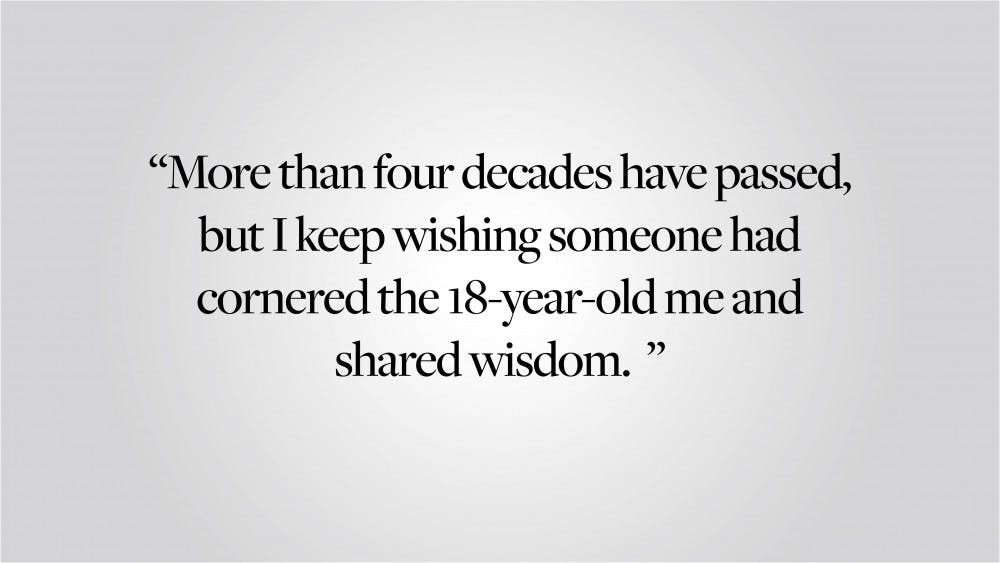Driving on I-95 in the late summer, I feel something tugging me back to College Hill. As I stroll past University Hall, the Rock and the Ratty, I get wistful. Why didn’t I make the most of those undergrad years? What if I knew then what I know now?
More than four decades have passed, but I keep wishing someone had cornered the 18-year-old me and shared wisdom. As classes start for thousands of students at Brown and across the country, I want to offer several bits of advice.
1. Rethink the boundaries of “campus.” Brown University is your campus, but so is Providence. So is Boston, New York … even Pawtucket. Yes, Pawtucket: I walked through American history one weekend while wandering around the Slater Mill, which flailed in the late 1700s until an immigrant fixed its textile machines. I developed an appreciation for neoclassical architecture by taking off a couple of afternoons to explore the Rhode Island State House (“fourth largest self-supported marble dome in the world!”). And okay, my non-credit music classes came at 2 a.m., watching bands play on the beer-stained floors of Lupo’s Heartbreak Hotel.
2. Talk less, listen more. This is my take on Aaron Burr’s quip in “Hamilton”: “Talk less, smile more.” The bigger the difference in your backgrounds, the more you should listen to the other person: 99% of the time, this person can teach you something about society. Or life. Or love.
A corollary: Get to know not just the faculty but the workers who surround you. Listen actively, listen acutely. You’ll be surprised by their experiences and pick up something you’d never be able to find in a classroom.
3. Remember that your education doesn’t stop when you earn a degree. This should take some pressure off students who, like me, feel they need to cram in every class, every club, every opportunity in four years. It took me a while to understand that one goal of a college education is to cultivate lifelong curiosity. Long after that bachelor’s or master’s or Ph.D., you'll dabble in provocative classes.
A few words about that third pointer: Yes, I loved Brown; I even enjoyed a fellowship at (ugh!) Harvard. But the pinnacle of my education came in South Florida at a cinder block community college, now called Palm Beach State College. After working dayshifts as a newspaper reporter, I studied Spanish at night alongside electricians, plumbers and long-haul truck drivers.
Those language lessons — more than anything I learned on two Ivy League campuses — let me realize my dream. Soon after, I became a foreign correspondent. I spent a decade living in Mexico, Colombia and Brazil.
I'm not asking you to hear my advice alone. As I struggled to decide what I would tell the shy, gawky 18-year-old me and as the deadline for this piece neared, I did what any writer does when thinking Really Big Thoughts: I sent out my buddies a slew of texts, emails and WhatsApp messages (this is formally known as “intensive research”).
What, I asked, didn’t we know back when we should’ve known it? The responses flooded in. Brown alums are hardly reserved when it comes to proffering opinions. Once again, I realized that four years on College Hill gave me a gift: A dazzling array of friends, colleagues and empathic strangers who share a connection to Brown.
Here are three pieces of their wisdom, along with their brief biographies:
“Failing a class for the first time in your life may be the best thing that ever happens to you; it will teach you resilience.” — Chris Rebholz ’82, who has an electrical engineering undergrad degree from Brown plus a doctorate in clinical psychology and now works as a clinical and forensic psychologist.
“Set a goal of being able to craft a good essay, write code and author a business plan, even if you are a music major.” — José Estabil ’84 ScB., ’88 ScM, who helps entrepreneurs improve society through Latinos in Bio, MIT Deshpande Center and Harvard Business School Field X.
“For any decision that does not involve your personal safety, say “yes” to the offers you are initially inclined to say “no” to.” — Jonathan Eig ’84, who was about to go to law school when he realized he could not stay awake long enough to get through the readings. So instead, he taught film in Washington, D.C. for 25 years before retiring to pursue his own writing projects.
Now that I write this, I fear that my pointers will seem pointless. My own kids scoff when I utter what I believe are incredibly savvy insights. So, a final bit of advice: As you go to your classes, your clubs, your workouts … look into the future to imagine what guidance you should get from an older version of you.
David L. Marcus traveled the world as a journalist and wrote two books about education, Acceptance and What it Takes to Pull Me Through. He is now senior editorial manager of the Aspen Institute College Excellence Program.





